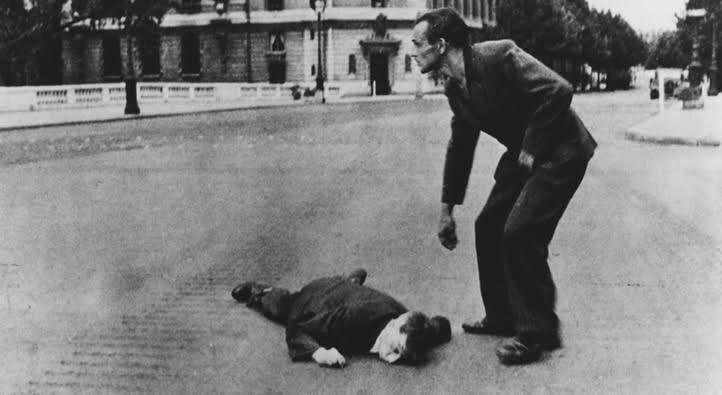
Resistance (1976)
“An extraordinary use of cinema, Resistance, Grand Prize winner at the Hyeres Festival, is Ken McMullen’s experimental investigation into both the French resistance and the resistance of the conscious mind to repressed memories.”
— Caroline Tisdall, The Guardian
Resistance is a 16mm colour feature film (90 minutes). It assembles fragments of raw material (archive film, performances, music, historical and psychological contradictions) and attempts to make a whole. The historical focus of the film is the French Resistance. Although the film deals only intermittently with the Resistance, it does describe quite faithfully the way in which ex-resistors render up their past in terms of ready made mythologies.
Resistance takes its starting point from a real event. In 1948 five former heroes of the French Resistance found themselves in various states of mental breakdown. They had problems of re-adjusting to so-called normal life. They were plagued by memories of betrayal, crises of guilt for those who had died, rancour of rivalries created before the war had even began. Taken through therapy by an analyst, they were encouraged to re-enact their traumas as psychodrama.
The record of this was found by the historian Rod Kelward who was then writing a book on the French Resistance. As a preparation for the making of the film he read it out in twice weekly instalments to McMullen’s friends: two professional actors, and the artists Stuart Brisley, Marc Chaimovicz and Anna Kolpy.
Twenty hours of psychodrama shot on 1″ video tape produced the performance material (50 minutes of the finished film). This part of the film was made in an isolated location where the participants spent a week working through and re-analysing their performances in an attempt to merge elements of their own personalities with the fictional roles imposed on them. A practising psychoanalyst took part in this. The other sections in the film are made up of archive footage and work using back projection and re-filming. Any black and white material was tinted. Various processes of transferring film to video and video to film were used.
“Resistance is a subtle complex and richly textured a film I have seen in many a year. McMullen uses improvisational actors, newsreel footage of the French resistance, video , film and the musical talents of Brian Eno, and a real psychoanalyst to recreate a psychodrama conducted by a psychoanalyst in 1948. The purpose of the film is, on one level to recreate this event in order to come to some understanding of what those people went through, at the same time, McMullen is interested in probing the meaning of the act of resistance, the motives of his improvisational troupe, and the nature of film itself.
The film seems unwieldy and in danger of becoming so complicated that it threatens to dissolve into a welter of contradictions and misunderstandings, until one of the actors decides to take matters into his own hands, by staging his own suicide(over the objections of the psychoanalyst and the Director who enters into the film at this point) the actor shows us the radical implications of an act of resistance to authority figures, at the same time he exposes, by spontaneous vigour of his act how self-involved and timid the other improvisers are being by sticking to the original premise.
McMullen has constructed an elaborate, wonderful artifice. The delicate dance he performs between the levels of meaning in his film is something to behold: moreover, at the end of it one is left with a strong sensation of an England poking among other peoples identities and pasts for something to borrow and call it’s own. If that sounds like too heavy a burden of meaning for any 90 minute film to hold then that is the measure of Ken McMullen’s accomplishment.”
— Cinema Canada, International Film reviews
Resistance (1976)| Director Ken McMullen |Runtime 90 min | Country UK | Black &White and Colour |16mm| Producer Christopher Rodrigues | Cast Stuart Brisley, Marc Chaimowicz, Ian Kellgren, Lesley Pitt; Anna Koply, Arnold Linken, Elizabeth Richardson,Terry James | Original Music Brian Eno| Film Editing: Robert Hargreaves

